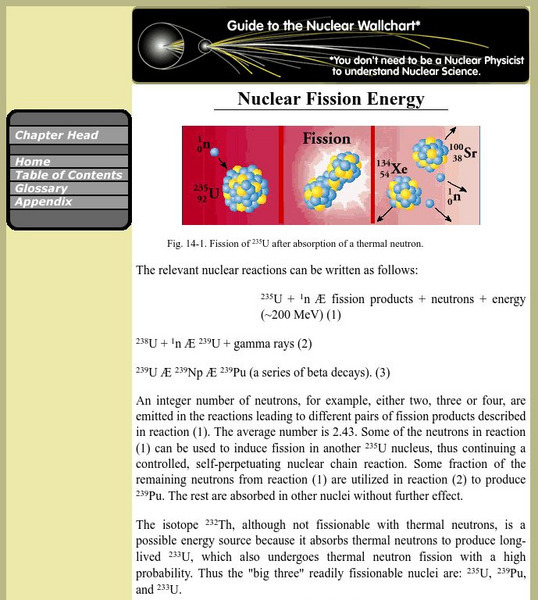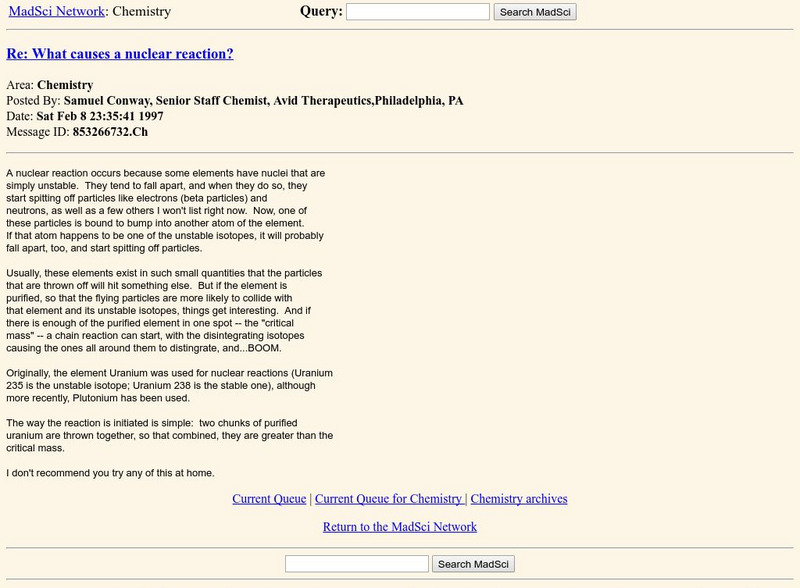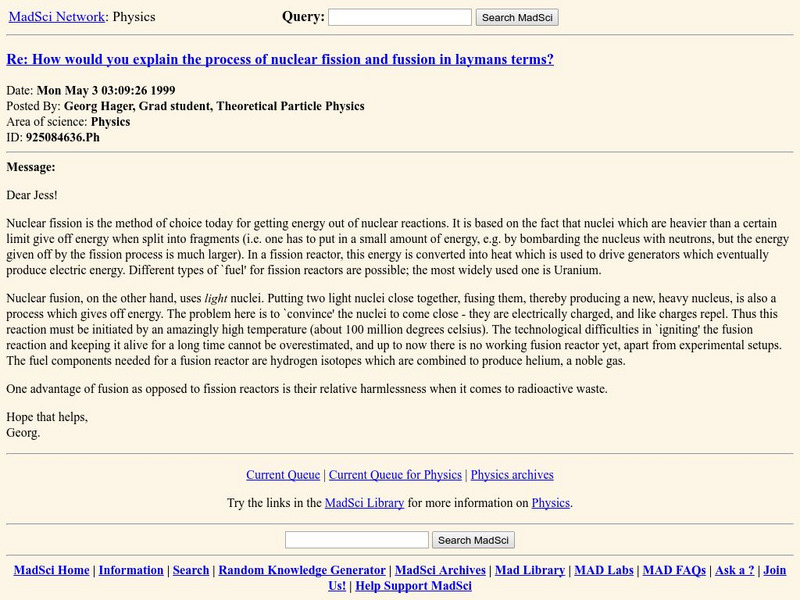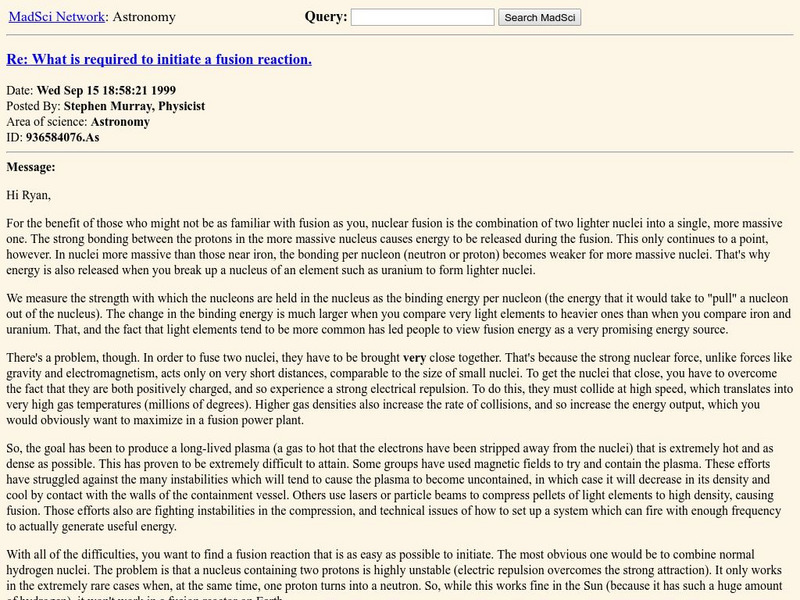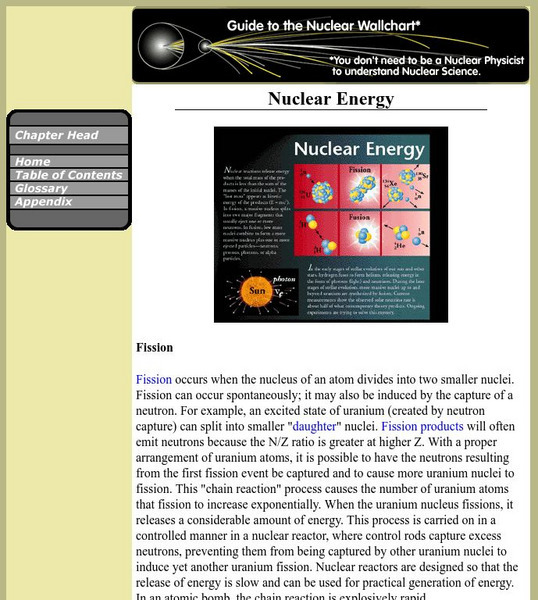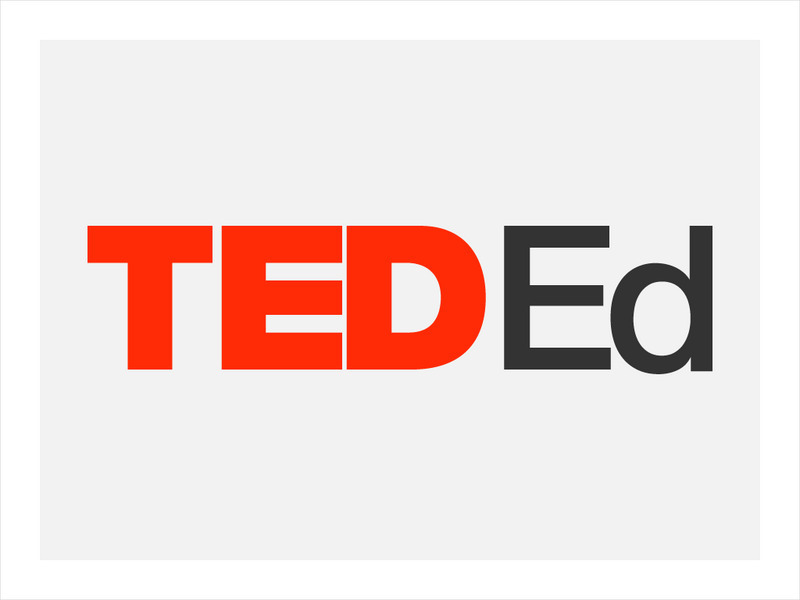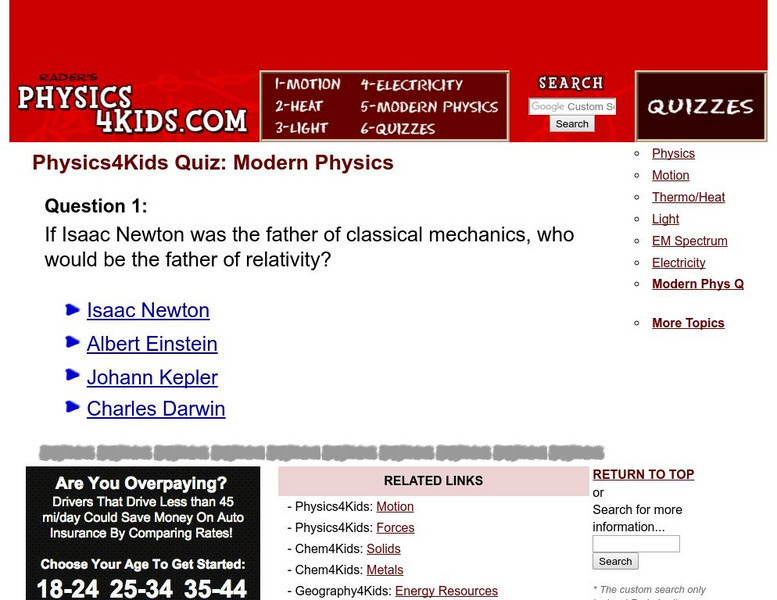Texas Education Agency
Texas Gateway: Fusion and Fission
Given diagrams, illustrations, symbols, or descriptions, student will distinguish between nuclear fusion and nuclear fission.
Lawrence Berkeley National Laboratory
Berkeley Lab: Nuclear Fission Energy
Resource explains and illustrates nuclear fission energy.
Other
Nuclear Threat Initiative: Nuclear 101: Nuclear Weapons
Interactive tutorial helps with understanding nuclear weapons, the different types, how they are different from conventional weapons, and how many countries have developed them.
Georgia Department of Education
Ga Virtual Learning: Nuclear Physics
Through informational text, interactive activities, and virtual animations students learn about the atomic nucleus, fission, fusion, and radioactive decay.
Other
Need: Exploring Nuclear Energy [Pdf]
This downloadable article addresses all aspects of nuclear energy. Visual charts make understanding of cycles and concepts easier. Most useful for older students and educators. PDF (requires Adobe Reader).
Chiral Publishing
Chiral Publishing: An Introduction to Chemistry: Nuclear Chemistry: Audio Book
Learn about nuclear energy as you listen to the audio book describing nuclear chemistry. View maps, examples, graphs, and pictures describing everything from electrons to beta emissions and more.
Atomic Archive
Nuclear Fusion: The Hydrogen Bomb
From the Atomic Archive - the online companion to the award-winning CD-ROM. This page (and the couple that follow from it) describe the use of fusion reactions in a hydrogen bomb. A schematic diagram of an H-bomb is given and discussed....
MadSci Network
Msn: What Happens in a Nuclear Reaction?
From The Mad Scientist Network web site. Using a question and answer format, this page discusses three types of nuclear reactions - spontaneous decay reactions, nuclear fision reactions, and nuclear fusion reactions. Each reaction type...
Ducksters
Ducksters: Physics for Kids: Nuclear Energy and Fission
Kids learn about nuclear energy and fission in the science of physics including E=mc2, power plants, uses of nuclear power, and fusion.
Georgia Department of Education
Ga Virtual Learning: Physical Science: Nuclear Chemistry
A complete learning module with interactive activities as well as informational text to help students distinguish the characteristics and components of radioactivity.
MadSci Network
Msn: How Would You Explain the Process?
From the Mad Scientist Network web site. Using a question and answer format, this page explains the differences between nuclear fusion and nuclear fission. The details of each process are sketched in simple language.
MadSci Network
Msn: What Is Required to Initiate a Fusion Reaction?
From the Mad Scientist Network web site. Using a question and answer format, this page provides a thorough discussion of fusion reactions. Fusion and fission are compared and contrasted and the mechanisms which must occur to initiate and...
Lawrence Berkeley National Laboratory
Berkeley Lab: Nuclear Energy: Fission/fusion
Provides a definition and explanation of fission, the splitting of a heavy nucleus into two roughly equal parts, and fusion, the process where two nuclei combine together to form a larger nucleus.
Lawrence Berkeley National Laboratory
Berkeley Lab: Basic Nuclear Science Information
Site provides the ABC's of nuclear science including radioactivity and gamma decay to fission and comic rays.
Nobel Media AB
The Nobel Prize: Energy From Matter
The history of energy being transformed from matter is provided at this site. The information starts at Einstein's formula, then discussions fusion, future energy sources, fission, and nuclear reactors.
NASA
Nasa: Exploring Climate Change
Test your knowledge of energy and its role in Earth's climate system with these interactive quizzes.
TED Talks
Ted: Ted Ed: If Superpowers Were Real: Body Mass
What if manipulating body mass wasn't just the stuff of fantasies and comics? Is it scientifically possible to manipulate your body mass? In this series, creator and educator Joy Lin tackles superpowers and reveals just how...
Stanford University
Stanford Report: Edward Teller, Father of Hydrogen Bomb
Students don't generally learn much about Edward Teller in school. But with the progress in science in the 20th century, maybe they should. Edward Teller was one of the main architects of the hydrogen bomb. This is a great site by...
Other
Review Game Zone: Earth/environmental Science Ncfe Review Part 1
Take this 10 multiple choice question quiz on earth and environmental science.
Physics4kids
Physics 4 Kids: Modern Physics Quiz
Take this ten question multiple choice quiz on modern physics



